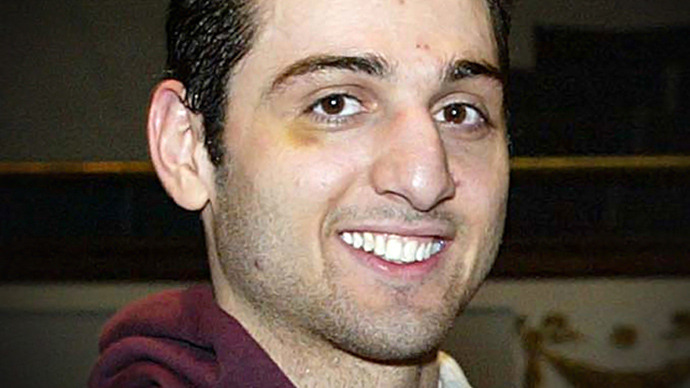
Why Tamerlan Tsarnaev Is Outside of Chechen Mentality
Publication: Eurasia Daily Monitor Volume: 10 Issue: 83
By:

Why did Tamerlan Tsarnaev—one of the alleged April 15 Boston Marathon bombers who died in a shoot-out with police on April 18—not demand an end to the bloodshed in Dagestan, but was instead interested in what happened in Afghanistan and Iraq? The casualties in Dagestan are quite comparable to the casualties in those countries: in 2012, nearly 700 people were killed or injured in the republic, while in 2011, the figure was 800 (www.kavkaz-uzel.ru/articles/218698/). Dagestan was Tamerlan’s homeland on his mother’s side and the place where he lived for one and a half years, in 1999–2001, and where he spent six months in 2012. So why did Dagestan not become important to him?
The members of the Tsarnaev family who were born in the Central Asian country of Kyrgyzstan bore the historical memory of Soviet repression against the Chechens. The deportation of 1944 remains one of the most important historical memories for all Chechens of all generations (see EDM, February 22, 2007). The Tsarnaev family, descendants of the Keloi highlanders’ clan, whose members reside in the Chechen village of Chiri-Yurt, chose not to settle in their historical homeland, but in neighboring Dagestan.
In Chechnya, there are no nursing homes and orphanages, not because there are no elderly, orphans or sick people, but because every person is cared for by his or her family, relatives and clan, and the society as a whole. Parents never live on their own, because the youngest man in the family is required by common law to live with his parents until they pass away.
The Chechens say “it is hard to be a Chechen” (https://old.sakharov-center.ru/chr/chrus04_1.htm). This means that the Chechen mentality shapes the surrounding world in a very specific manner, through the prism of duty before the Chechen people, ancestors, history, traditions and customs, Islam and so on. The question whether he or she is a Muslim is meaningless to a Chechen, since being a Chechen and a Muslim are seen as identical.
It is especially difficult to understand the underlying logic of Tamerlan Tsarnaev, whose life in the United States cut him off from the Chechen world, so that there was quite little that connected him to Chechnya, apart from the language. This is a rare feature among Chechens. Since the family was of mixed Chechen-Dagestani origin, the father being an ethnic Chechen and the mother being an ethnic Avar from Dagestan, Tamerlan’s links to the Chechen culture must have been impaired. Being born to parents with superficial knowledge of the Muslim faith, Tamerlan appears to have started his exploration of Islam under the influence of Salafist ideology. Salafist teaching does not recognize nationality and requires a rejection of traditions, customs and one’s family. In the Chechen case this would be equal to a dismissal of the cult of parents. All of these requirements of Salafism put the young person outside the cultural code of his people and forces him to become a subject of the universal Muslim culture.
After the Boston bombings, all Chechens are asking the same question—why did Tamerlan pick the US as the target of the attack? If he wanted to take revenge for Chechnya or for Dagestan, he had the ideal opportunity to do so when he was in Dagestan for six months in 2012. All that he would have been required to do was to prove that he was not a Russian security services agent and then join the rebel forces. Instead, Tamerlan traveled back to the United States.
The report in the newspaper Novaya Gazeta, alleging a link between Tamerlan and the slain young Dagestani Mahmud Mansur Nidal (www.novayagazeta.ru/inquests/57925.html), seems highly implausible. According to the police, Nidal joined the underground movement in December 2011 (https://polit.ru/news/2012/05/19/mansur/). The article’s claim that Tamerlan traveled to Toronto as an opportunity to meet local radicals such as William Plotnikov—who allegedly studied Islam in Dagestan in 2010 and was killed in this North Caucasian republic in 2012—is also a stretch and likely to mislead a casual reader.
While many look for Tamerlan’s contacts in Dagestan, he more likely became a Salafist not in the Caucasus, but in Boston. The roots of his transformation into a radical should be found there, not in Dagestan and even less so in Chechnya. Indeed, it was Boston that became the centerpiece of Tamerlan’s ideological base and caused him to seek justice for the killings of Muslims in Afghanistan and Iraq, not for the killings in Chechnya or in Dagestan. So at that moment he did not perceive himself as a Chechen, which is not typical for a Chechen at all.
The story surrounding his mysterious Boston contact named Misha is indicative of how young Muslims turn violent in the US and why Islamic youth become aggressive and willing to surreptitiously but violently strike out against their society. Had Misha not existed, he would have been invented (www.huffingtonpost.com/2013/04/23/tamerlan-tsarnaev-mysterious-muslim-radical_n_3141919.html). Misha may very well have recruited Tamerlan as the circumstances were favorable. Tamerlan came from a nation that is entirely Muslim. The only thing that was required from the recruiter was to convince Tamerlan of the injustice that some people inflict on Islam worldwide. To convince someone like Tamerlan of joining an ongoing worldwide jihad, he would have to have been deprived of contacts with Americans, their culture and only be told about society’s negative attitude toward Islam.
Thus, it would be fruitful to explore the atmosphere that causes a young, promising person to abandon the opportunities for becoming the pride of a nation and turn into its enemy—despite the fact that the society provided him with an education, career and opportunities for personal success. Only by examining these paths is it possible to thwart future strikes by the supporters of war and conspiracy theories.
According to experts who visited Dagestan and truly experienced surveillance by the Federal Security Service (FSB), Moscow should have been aware of every step of a young man who came from the US (www.golos-ameriki.ru/content/boston-terror/1649772.html). The FSB was certainly aware of all of Tamerlan’s contacts and the details of his stay in the capital of Dagestan. Makhachkala experiences bomb explosions, firefights between rebels and police, killings of young people and arrests of militant sympathizers on almost a daily basis. The FSB should have asked for information from their American counterparts after Tsarnaev’s visit to Dagestan in 2012, not only in 2011, before he made that trip. Knowing of Tamerlan’s suspicious contacts in Dagestan in 2012 and having suspected him as early as 2011, it is unclear what prevented the FSB from seizing him when he was leaving Russia via Moscow’s Sheremetyevo Airport. What prevented the FSB from giving this information to the US? The answer must arguably be that there was nothing suspicious in his behavior at the time. The manufacture of a North Caucasian link to Tamerlan’s attack started only after the tragedy in Boston, so that Russia could take part in the investigation in Boston.
In all this tragedy, Moscow seems to consider itself a winner. President Vladimir Putin said at a press conference that Russia had long sought cooperation from the US in the field of international terrorism (www.golos-ameriki.ru/content/putins-live-show/1648501.html). There was more of a reprimand of the US in Putin’s words than an admission of Russia’s own guilt for the attack in Boston. Moscow interprets terrorism in quite broad terms and includes everyone who is dissatisfied with the Russian political system and seeks to secede from Russia.
The development of American youth under the conditions of multiculturalism will shed more light on Tamerlan’s evolution than his contacts in the North Caucasus. Locating Tamerlan’s ideological trajectory in the North Caucasus may prove to be little more than a distraction. The available evidence suggests that he broke all connections with that part of his life and became a young radical while living in Boston.




